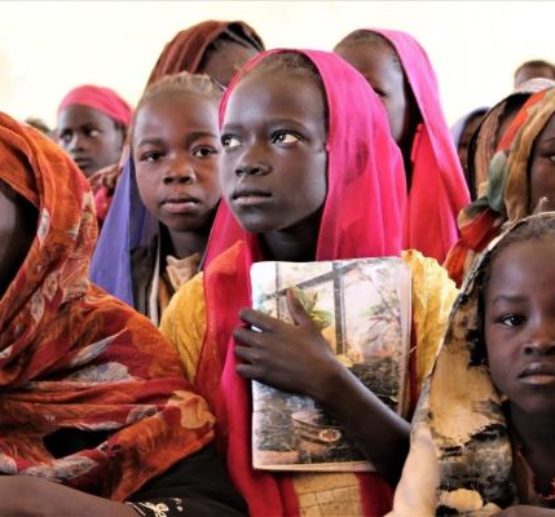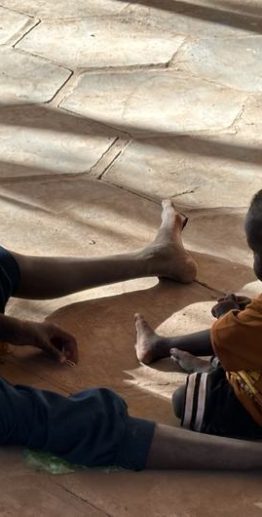Weekly Policy Statement
July 11, 2025
Mass Displacement, Targeted Attacks, and Funding Cuts Put Sudanese People in Imminent Danger
Since April 2025, the Rapid Support Forces (RSF) and allied militias have laid siege to El Fasher, Zamzam camp, and surrounding areas, deliberately cutting off food, water, and medical care. El Fasher is the last of Darfur’s five state capitals that is not yet under RSF control. According to recent reporting from MSF, this siege has resulted in the intentional starvation of civilians, and the collapse of already fragile living conditions. What we are witnessing is not merely a war- it is a genocide unfolding in real time, marked by mass displacement, sexual violence, starvation, and deliberate targeting of non-Arab communities. The people of Darfur, Kordofan, and Khartoum are bearing the brunt of unimaginable violence.
On June 16th, the UN High Commissioner for Human Rights Volker Turk warned of escalating violence in North Darfur and Kordofan, his office documented a tripling in the number of arbitrary killings of civilians between February and April, along with rising incidents of sexual violence and attacks on humanitarian workers.
We at DWAG call for critical action to be taken. As targeted ethnic violence intensifies, legal repression becomes more commonplace, the rainy season approaches, and global humanitarian aid funding is slashed, the people of Sudan are in a dire and deteriorating situation.
Recent Atrocities and Escalations
On June 11th, RSF seized Karab El Tum, near the Sudan–Libya–Egypt border, signaling growing regional entanglement and military expansion. On June 15th, heavy fighting erupted in El Fasher, including drone attacks on residential areas and camps for displaced people. At least 35 children went missing, allegedly detained by RSF. The continued siege on El Fasher included on June 16 RSF bombing a shelter for displaced people in El Fasher, killing 10+ civilians and injuring 40 people. Also a report was released by the African Centre for Justice and Peace Studies, outlining an uptick in human trafficking, specifically in Darfur, Khartoum, and Al Gezire. The findings reveal that human trafficking networks often collude with government actors, and detail incidents of kidnapping, sexual slavery, forced recruitment, and forced labor. To add to this. On June 30th, RSF rejected a UN-proposed ceasefire and resumed artillery strikes on El Fasher. Civilian deaths and malnutrition cases continue to rise.
On July 3 MSF released a report documenting systematic atrocities including rape, starvation, and forced displacement, based on over 80 testimonies. See the full report here, and press statement here. Dbanga Sudan has documented more than 190 families having been displaced.
On July 6th, IOM confirmed that 99% of Zamzam Camp’s population had fled. Displaced people are now scattered across 26 localities in four states, facing critical conditions.
Along their route; they faced murder, illness, physical assault, and gender-based violence, highlighting the extreme vulnerability of displaced populations and the chilling conditions they face as they seek safety.
Most recently, from July 7th to 9th, shelling inside Abu Shouk camp killed three civilians and injured many more. As a reminder, this is a displacement camp where famine was confirmed last year. This tragic incident is another reminder of the toll this conflict is taking on civilians.
Targeted Ethnic Violence and Legal Repression Intensifies
Across Sudan, volunteers, journalists, aid workers, and lawyers are being arrested arbitrarily. In Al-Jazeera State and Khartoum, many remain imprisoned without charges. Civil society is under siege through increased surveillance, repression, and intimidation. The recent arrests of journalists in El Fasher reflects a broader trend of information suppression, as military actors attempt to silence witnesses and isolate Sudan from the global community.
The recent MSF report confirms the RSF’s systematic targeting of non-Arab communities. One survivor stated, “The RSF does not treat tribes equally, they treat Arabs better than non-Arabs, light skinned people better than dark-skinned people, and those speaking the nomads’ type of Arabic better than those speaking the city style or another language.” Specifically, many Zaghawa people were interviewed in this report, and many villages that were targeted in recent RSF attacks were known to be home to Zaghawa communities. One man said, “They were asking people if they belonged to the Zaghawa, and if they did, they would kill them.” This is the language and behavior of genocide, and the international community must respond accordingly.
Additionally, on July 9th in Khartoum State, Sultan Hassan Musa, the leader of the Nuba people, accused government forces of demolishing 806 Nubian homes and pursuing oppressive and ethnically-targeted policies. These acts constitute ethnic persecution and cannot be tolerated.
Flooding and Upcoming Rainy Season
On June 17th, Nakhil camp in East Darfur warned that the upcoming rainy season will only worsen living and health conditions. Women in the camp pleaded for water, seeds, food, and warned of famine.
A UN briefing on July 9th reported that flash floods devastated the Northern Delta locality of Kassala State, further impeding aid delivery. We must work to ensure people have clean drinking water, proper sanitation services, humanitarian aid, and food as the rainy season approaches.
On July 10th, flooding in Kalma camp and South Kordofan washed away roads, and cut access to clean water and aid. This is an early indication of imminent disaster as the rainy season begins.
Humanitarian Funding Cuts are Costing Lives
On July 7th, the World Food Programme (WFP) warned that severe funding shortfalls will soon force cuts to food assistance for Sudanese refugees. The UN also reiterated the need for humanitarian aid funding in a statement on July 9th, calling for the international community to scale up support. As of July 9th, the $4.2 billion response plan for Sudan is less than 25% funded, with only $917 million left in the bank. This is not just a crisis of violence, it is one of abandonment. Displaced and starving civilians are met with scarcity, not support, as they flee.
DWAG’s Urgent Demands to the International Community
- Authorize urgent and unimpeded access to humanitarian aid for all in need across Sudan;
- Swiftly authorize and deploy civilian protection forces to protect the innocent Sudanese people, particularly in Darfur;
- Press the warring parties to stop the torture, murder, rape, and starvation of civilians as a strategy of war;
- Demand that the warring parties to immediately cease all attacks and strictly adhere to a permanent, verifiable ceasefire;
- Impose criminal and financial accountability for all individuals and states complicit in committing past and present genocide and war crimes in Sudan;
- U.S., UNSC, and allies must hold the regional and international enablers supplying weapons to the warring parties in Sudan accountable;
- US and allies must cease the selling of arms to the UAE and prevent genocide in Sudan.
As this genocide intensifies, we issue this urgent plea to the global community: Act now! The people of Darfur and Sudan at large are facing mass killings, forced starvation, and targeted ethnic violence at the hands of armed actors who continue to operate without consequence. We must raise our voices, demand accountability, and call on world leaders to protect civilians and support the Sudanese people in their fight for survival, safety, and peace.
Please join our Stand with Sudan campaign to take action, support the life saving effort and rally others to be a voice for the people of Sudan. The time to act is now.
With our collective effort we can ease the suffering, compel our leaders to act and hold those responsible accountable.
With Gratitude,
Niemat Ahmadi,
DWAG President



